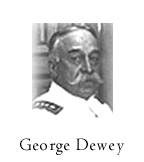|
The
Philippine Revolution
|
|
|
|
|
|
|
|
|
|
|
|
|
|
|
|
|
|
Truce
of Biak-na-Bato and the Betrayal of the Revolution
The
death of Bonifacio was a turning point in the Revolution.
The stewardship of the Revolution was left to Aguinaldo
and the elite. But the Filipinos and the Spaniards
faced a long haul. Aguinaldo’s troops were being
routed in Cavite and, thus, his revolutionary government
moved to the more secluded Biak-na-Bato in Bulacan.
At this time, Aguinaldo’s commitment to the revolutionary
cause became suspect. His military advisers persuaded
him to issue a declaration that his Biak-na-Bato government
was willing to return to the fold of law as soon as
Spain granted political reforms. These reforms included
the expulsion of the hated Spanish friars and the
return of lands they appropriated from the Filipinos;
Filipino representation in the Spanish Cortes; freedom
of the press and religious tolerance; equality in
treatment and payment for both peninsular and insular
civil servants; and equality for all before the law.
This pronouncement by Aguinaldo proved that he and
the ilustrados were willing to return to the
Spanish fold provided there were reforms and the ilustrado
interests were met.
The
standoff in the battlefield prompted both sides to
agree to an armistice. The Truce of Biak-na-Bato stipulated
that Spain would pay financial remuneration to the
Filipino revolutionaries in exchange for the surrender
of arms and the voluntary exile abroad of Aguinaldo
and the other leaders. Toward the end of December
1898, Aguinaldo and the other revolutionary leaders
went into voluntary exile in Hong Kong and they were
given the initial sum of 400,000 pesos, most of which
were deposited in a Hongkong bank and used later on
to purchase more weapons. Distrust on both sides resulted
in the failure of the truce. Both sides were only
biding time until they could launch another offensive.
 The
coming of the Americans marked the second phase of
the Philippine Revolution. In Singapore, Aguinaldo
met U.S. consul Spencer Pratt who persuaded him to
cooperate with the Americans. In February 1898, the
American warship Maine was mysteriously sunk in the
waters of Havana, Cuba. This incident was the immediate
cause of the Spanish-American War. Admiral
George Dewey who was stationed in Hongkong received
a cable on April 25 announcing that war had commenced
between the two countries. He was ordered to retake
the Philippines and, on May 1, 1898, his flagship
U.S.S. Olympia defeated the Spanish fleet in the Battle
of Manila Bay at a cost of eight wounded Americans
and around five hundred casualties on the Spanish
side. Back in Hongkong, Aguinaldo was told by U.S.
consul Rounsenville Wildman that Dewey wanted him
to return to the Philippines to resume the Filipino
resistance. Aguinaldo claimed that the American officials
prodded him to establish a Philippine government similar
to the United States, and that they pledged to honor
and support the Filipinos’ aspiration for independence.
Spencer, Wildman, and Dewey would later deny having
made any promise or commitment to Aguinaldo. The
coming of the Americans marked the second phase of
the Philippine Revolution. In Singapore, Aguinaldo
met U.S. consul Spencer Pratt who persuaded him to
cooperate with the Americans. In February 1898, the
American warship Maine was mysteriously sunk in the
waters of Havana, Cuba. This incident was the immediate
cause of the Spanish-American War. Admiral
George Dewey who was stationed in Hongkong received
a cable on April 25 announcing that war had commenced
between the two countries. He was ordered to retake
the Philippines and, on May 1, 1898, his flagship
U.S.S. Olympia defeated the Spanish fleet in the Battle
of Manila Bay at a cost of eight wounded Americans
and around five hundred casualties on the Spanish
side. Back in Hongkong, Aguinaldo was told by U.S.
consul Rounsenville Wildman that Dewey wanted him
to return to the Philippines to resume the Filipino
resistance. Aguinaldo claimed that the American officials
prodded him to establish a Philippine government similar
to the United States, and that they pledged to honor
and support the Filipinos’ aspiration for independence.
Spencer, Wildman, and Dewey would later deny having
made any promise or commitment to Aguinaldo.
|
|
|

